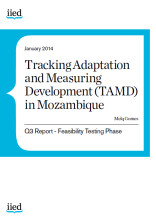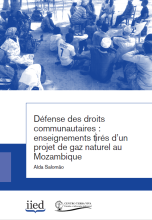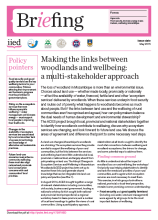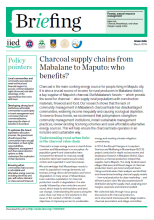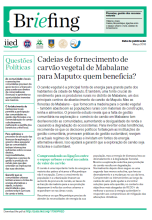/ library resources
Showing items 3340 through 3348 of 3400.Mozambique is the 8th most vulnerable country to climate change and is one of the poorest countries in the world with a high dependency on foreign aid. The population is primarily rural and dependent on agriculture, with 60% living on the coastline.
Tracking adaptation and measuring development (TAMD) is a twin-track framework that evaluates adaptation success.
Ces dix dernières années, le Mozambique est devenu une cible privilégiée de la ruée mondiale vers les terres.
Mozambique has become a hot spot in the global rush for land in the last decade.
In Mozambique there is strong support for sustainable agriculture from different actors, with approaches including agroforestry and conservation agriculture increasingly promoted throughout the country by the
The loss of woodland in Mozambique is more than an environmental issue. Choices about land use — whether made locally, provincially or nationally — affect the availability of water, firewood, fertile land and other ‘ecosystem services’ delivered by woodlands.
Uncertainties in the international carbon market make it imperative the UN’s REDD+ framework engages a wider spectrum of the private sector than just international companies and investors.
Charcoal is the main cooking energy source for people living in Maputo city. It is also a crucial source of income for rural producers in Mabalane district, a key supplier of Maputo’s charcoal.
O carvão vegetal é a principal fonte de energia para grande parte dos habitantes da cidade de Maputo. É também, uma fonte crucial de rendimento para os produtores rurais no distrito de Mabalane, um dos principais centros de abastecimento de carvão de Maputo.
Paginación
Land Library Search
Through our robust search engine, you can search for any item of the over 73,000 highly curated resources in the Land Library.
If you would like to find an overview of what is possible, feel free to peruse the Search Guide.

